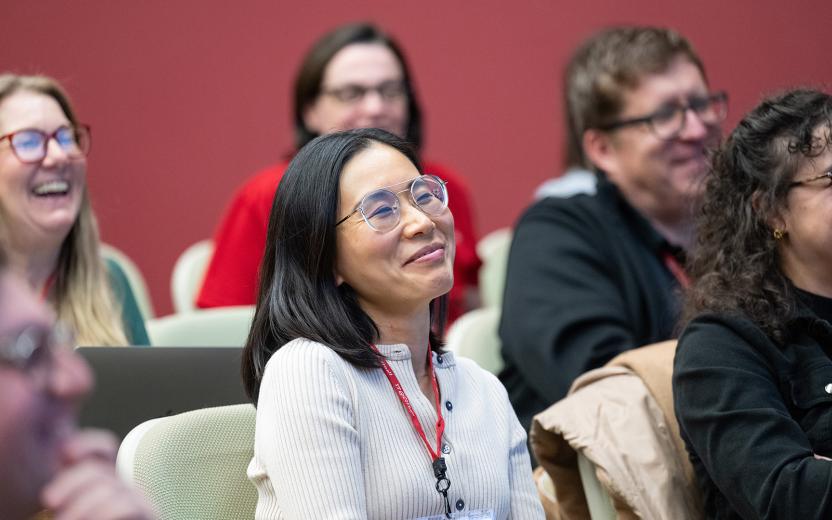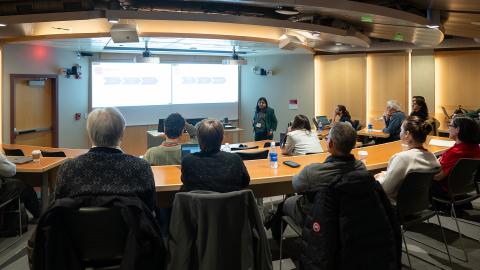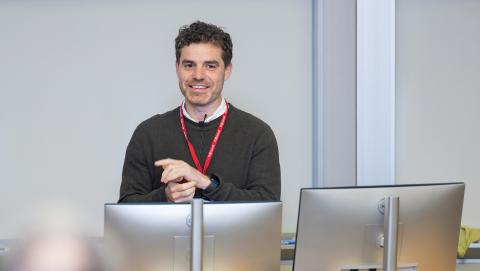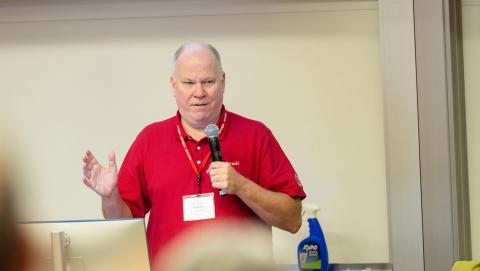Latest News

On the afternoon of October 15, 2024, concurrent breakout sessions engaged the Emerging Tech Dialogue participants in conversations about coming changes as well as how to approach and navigate the people-side of change, also known as organizational change management.
Managing the People Side of Change
“We are living in a time of great change,” said Tanya Grove, Cornell Senior Organization Development Consultant and a certified Prosci Change Practitioner and trainer. “To really survive and thrive, we really need to find ways to successfully manage large and complex changes at increasingly rapid rates.”
Grove introduced Prosci’s model for thinking about how people are impacted by big changes such as the Cornell Experience Modernization Initiative, how they experience these changes, and what their path might look like through the stages of awareness, desire, knowledge, ability, and reinforcement. She also contrasted project management and change management, highlighting how building relationships through change management early in a project helps ease individuals into their transition from the current reality to a different future state.
Training in the Prosci methodology will be broadly offered to the IT community on all campuses.
Cornell Experience Modernization Initiative (CEMI) Project
Navigating change is at the heart of the Cornell Experience Modernization Initiative (CEMI) program, presented by Devaki Ginde, Cornell IT Assistant Director for Strategic Portfolio Management. Building on the CEMI foundation laid earlier that morning by Curtis Cole, Cornell’s Chief Global Information Officer, Ginde revealed that over 700 applications and systems for managing key business functions are deployed at the university’s multiple campuses. Despite overlapping systems, the institution faces multiple technology constraints --such as the failure of the systems to support academic integration.
Like Groves, Ginde emphasized the importance of starting a project by focusing on people. Seeking input and feedback about current processes and systems from the community members who use these tools most, as well as continually communicating with each other, will enable the university to move from the current technology constraints into a state from which we can achieve Cornell’s strategic goal of an efficient, more unified digital experience.
Coherence: Enhancing the Human Operating System for New World Demands
To counter the stress of change, Cornell Senior Management Consultant Ari Mack taught his breakout session participants two simple coping mechanisms. First, he blended research with personal and work stories to introduce the spiral of unmanaged stress leading to exhaustion, to ineffective communication and reactivity, which is often accompanied by eroded trust and safety. This erosion can lead to a reduced quality of work and a resistance to change in general. Mack then demonstrated how to break the stress spiral with simple tools like mindfulness and biofeedback breathing.
Navigating Change: Catalyzing Innovation through AI at Cornell
When it comes to change in the rapidly evolving landscape of technology, nothing seems to be moving faster than artificial intelligence. Ayham Boucher, Head of AI Innovations for Cornell Information Technologies (CIT) at the Ithaca campus and Information Technologies & Services (ITS) at Weill Cornell Medicine, acknowledged the general fear that people have of artificial intelligence, and the concern that it will replace them in their jobs, but Boucher believes AI is a job booster rather than a job stealer.
“Humans are good at adapting. Human intelligence plus technical intelligence equals augmented intelligence,” said Boucher. Using several live demonstrations, he focused on the transformative potential of generative AI tools and their practical applications at Cornell, including requests they have addressed in the AI Innovation Lab.
Avoiding App-ocalypse
A key part of managing change centers around managing the lifecycles of mission-critical applications like finance and audit. Phil Robinson, Cornell University Library Director of Software Development, led a panel discussion on topics like data privacy and sensitivity, code review processes and unit tests, team and customer training, and other application management questions.
CIT application developer and DevOps engineer Jay Hulslander helps manage Kuali Financial Services (KFS). He described the application change management process his team follows for vendor updates, integration updates, and immediate remediation in need of an emergency fix.
Human Resources Administration and Technology colleagues Seth Brahler and Amy Parmley shared their process for managing changes to Workday, a system used on the Ithaca campus for HR payroll benefits, recruiting and talent management. They group their opportunities for change into those that happen to their system and those their team creates --usually in response to requests or feedback from their customers.
Watch the panel’s presentation.
Event Photos and Videos
More of the October 15 event photos and videos are now available with a NetID or CWID login.
Event Feedback and Suggestions
Take a five-minute survey to provide feedback on the October 15, 2024 Emerging Tech Dialogue or make suggestions for future themes, speakers, and activities.




Comments?
To share feedback about this page or request support, log in with your NetID